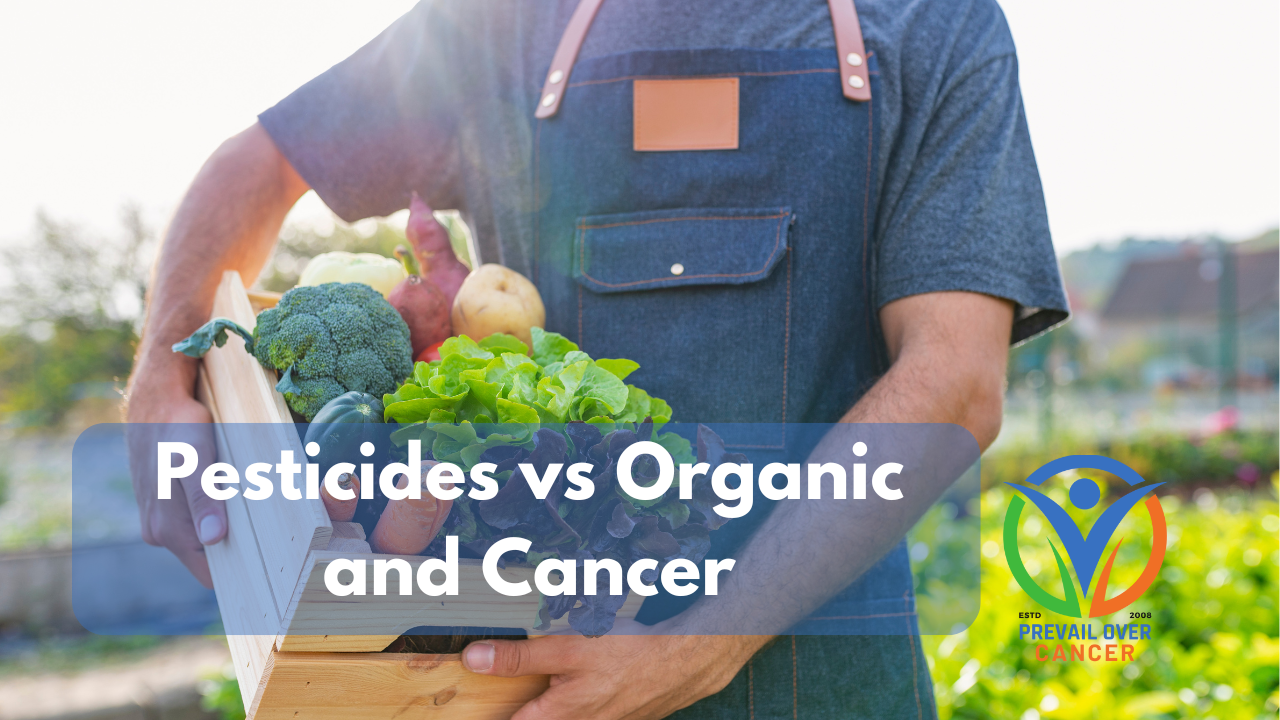Organic vs. Conventional Produce: Cancer Risk, Pesticide Exposure, and the Fight for Transparency

Exploring the Science Behind Organic Foods, Farmworker Health and Cancer Risks, and the Controversial Congressional Bill Shielding Pesticide Manufacturers
Researched and written by Keith Bishop, Clinical Nutritionist, Cancer Coach, Retired Pharmacist and Founder of Prevail Over Cancer.
As cancer rates continue to rise across the U.S., especially in agricultural states like Iowa, many are asking: could the food we eat—and how it’s grown—be part of the problem?
🚜 Conventional Produce and Pesticide Exposure
Conventional fruits and vegetables are often grown with synthetic pesticides and herbicides, including glyphosate, malathion, and chlorpyrifos—chemicals classified as probable or possible human carcinogens by the International Agency for Research on Cancer (IARC). While regulatory agencies like the EPA set limits on residue levels, recent studies suggest that even low-level, chronic exposure may contribute to cancer risk.
📍 Who’s Most at Risk?
- Farmworkers and pesticide applicators: A 2024 study in Frontiers in Cancer Control and Society found that pesticide exposure was linked to increased rates of leukemia, non-Hodgkin lymphoma, and cancers of the bladder, colon, lung, and pancreas—comparable in risk to smoking.
- Residents near sprayed fields: Take-home contamination and airborne drift expose families to residues, with children showing elevated levels of pesticides in urine.
- Consumers: While washing produce helps, it doesn’t eliminate all residues. The Environmental Working Group (EWG) found that over 75% of conventional produce contains detectable pesticide residues.
Based on recent peer-reviewed research, several cancers are now strongly suspected to be linked to food contamination from pesticides and herbicides. These associations are supported by population-level studies and epidemiological reviews:
🧬 Cancers Associated with Pesticide Exposure
|
Cancer Type |
Evidence Summary |
|
Non-Hodgkin Lymphoma |
Consistently linked to glyphosate and phenoxy herbicides in multiple studies |
|
Leukemia (especially AML) |
Strong associations found across high-quality prospective studies |
|
Prostate Cancer |
Elevated risk observed in large agricultural cohorts like the AHS |
|
Colon Cancer |
Dose-response relationships found in recent biomarker-based studies |
|
Bladder, Lung, Pancreatic Cancer |
Increased incidence in counties with high pesticide use |

Learn How to Select a Quality Dietary Supplement
🧠 Key Findings from Medical Journals
- A 2024 study in Frontiers in Cancer Control and Society found that pesticide exposure was associated with increased incidence of leukemia, non-Hodgkin lymphoma, bladder, colon, lung, and pancreatic cancers—comparable in magnitude to smoking for some types. Read the full study.
- The Agricultural Health Study (AHS), involving over 89,000 farmers, linked pesticide exposure to prostate, lung, pancreatic, colon cancers, and leukemia. Summary available here.
- A 2022 review in the International Journal of Cancer evaluated 63 epidemiological studies and found the strongest evidence for acute myeloid leukemia and colorectal cancer. Access the review.
These findings underscore the need for stricter regulation, improved exposure tracking, and public education on minimizing dietary pesticide intake.
Seminar Handout: Pesticides, Herbicides & Health Risks
🌱 Organic Produce: Does It Lower Cancer Risk?
Organic farming prohibits synthetic pesticides and fertilizers. While organic produce isn’t entirely pesticide-free, it typically contains fewer and less toxic residues.
🔬 What the Research Shows:
- A large French cohort study published in JAMA Internal Medicine found that frequent organic food consumers had a 25% lower overall cancer risk, especially for postmenopausal breast cancer and non-Hodgkin lymphoma.
- A 2023 review in the International Journal of Cancer highlighted consistent associations between pesticide exposure and cancers like AML and colorectal cancer, suggesting organic diets may offer protective benefits.
- Organic diets have also been shown to reduce pesticide residues in urine by up to 91% in just two weeks.
🛑 The Cancer Gag Act: Silencing Accountability?
In July 2025, Congress advanced Section 453 of the FY26 Appropriations Bill, dubbed the Cancer Gag Act by critics. If passed, it would:
- Shield pesticide manufacturers from lawsuits—even when their products cause cancer.
- Prevent the EPA from improving warning labels on pesticides.
- Undermine the public’s right to know and sue.
This bill follows Bayer’s push to avoid liability for over 180,000 Roundup-related cancer lawsuits.
📣 Take Action: Contact Congress
Several organizations are mobilizing to oppose the Cancer Gag Act and protect public health:
|
Organization |
Purpose |
Link |
|
Food & Water Watch |
Advocacy against Section 453 and pesticide immunity |
|
|
Farm Action |
Supports the Pesticide Injury Accountability Act |
|
|
Environmental Working Group (EWG) |
Tracks pesticide residues and legislative threats |
Contact these organizations for information and instructions on how to contact your elected officials.
EWG’s 2024 Dirty Dozen & Clean Fifteen
Here’s a visual guide to help you prioritize organic purchases:
DIRTY DOZEN (Higher Chemical Load - Buy Organic If You Can!)
- Strawberries
- Spinach
- Kale, Collard & Mustard Greens
- Grapes
- Peaches
- Pears
- Nectarines
- Apples
- Bell & Hot Peppers
- Cherries
- Blueberries
- Green Beans
CLEAN FIFTEEN (Lower Chemical Residue)
- Avocados
- Sweet Corn
- Pineapple
- Onions
- Papaya
- Sweet Peas (frozen)
- Asparagus
- Honeydew Melon
- Kiwi
- Cabbage
- Watermelon
- Mushrooms
- Mangoes
- Sweet Potatoes
- Carrots
Source: EWG’s 2024 Shopper’s Guide
How to Wash Pesticides and Insecticides Off Vegetables and Fruit

For a vegetable and fruit wash, use 1 to 2 tablespoons of baking soda per gallon of water. This ratio is gentle yet effective for removing dirt, wax, and some pesticide residues from produce. Here's a quick guide:
🥬 Baking Soda Wash Ratio
| Ingredient | Amount |
|---|---|
| Baking Soda | 1–2 tablespoons |
| Water | 1 gallon (16 cups) |
🧼 How to Use:
- Mix the baking soda into the water until fully dissolved.
- Soak produce for 10–15 minutes.
- Scrub firmer items gently if needed.
- Rinse thoroughly with clean water.
- Dry before storing or eating.
📚 Medical Journal References
Here are peer-reviewed studies that support the cancer concerns discussed:
- Pesticide Use and Cancer Risk
Frontiers in Cancer Control and Society (2024)
Comprehensive Assessment of Pesticide Use Patterns - Organic Food and Cancer Risk
JAMA Internal Medicine (2018)
Organic Food Consumption and Cancer Risk - Pesticide Exposure and Thyroid Cancer
Thyroid Research Journal (2023)
Human Exposure to Pesticides and Thyroid Cancer - Pesticide Exposure and Melanoma
Open Dermatology Journal (2023)
Pesticides and Pollutants Associated with Rising Cases of Melanoma - Pesticide Exposure and Renal Cell Carcinoma (Kidney Cancer)
Environmental Health Perspectives (2020)
Certain Pesticides Linked to Kidney Cancer





